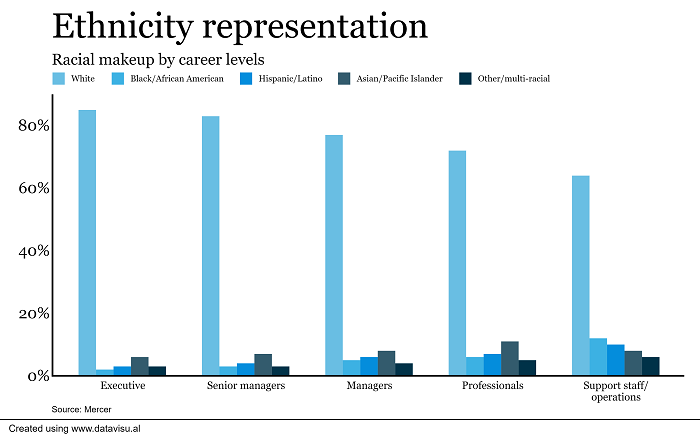As the United Nations’ 25th anniversary of the Fourth World Conference on Women takes place virtually this week, the challenges of driving inclusion and diversity on a global scale–where regional nuances differ from one part of the world to another–have never been more acute.
According to Silke Muenster, chief diversity officer at Philip Morris International (PMI), implementing an effective, metrics-driven diversity program is a considerable feat, but certainly attainable.
“In big companies, managers have to constantly juggle different priorities, so even when there are clear diversity targets in place–including hiring targets–it’s usually quicker to fill empty positions with men still today, due to higher numbers of male candidates than female candidates, particularly for leadership roles,” says Muenster, whose company has 73,500 employees globally.
This needs to change, she says, “and diversifying recruitment methods is one key way to attract more diverse talent,” she says.
 In a global company like PMI, a promotion may be linked to a change of country, and that can often be more difficult for women than for men, depending on the personal circumstances. As more flexible working arrangements have become the new norm amid COVID-19, this is opening up new opportunities to offer promotions to both women and men without them needing to relocate, she says.
In a global company like PMI, a promotion may be linked to a change of country, and that can often be more difficult for women than for men, depending on the personal circumstances. As more flexible working arrangements have become the new norm amid COVID-19, this is opening up new opportunities to offer promotions to both women and men without them needing to relocate, she says.
“To get more women into leadership positions, you need more women in the talent pipeline,” she says. “So, if your talent pipeline is imbalanced, it’s not surprising that your senior leadership will be, too. This sort of change doesn’t happen overnight and takes time.”
PMI is balancing more flexible working arrangements for staff who wish to continue to work safely from the office–wherever they are. And technology is, of course, playing a large role in that effort. For instance, through PMI’s forthcoming Smart Work hybrid model of remote and office-based work–due to be implemented once COVID-19 restrictions are lifted–employees who can perform their jobs remotely will have the option to do so depending on individual needs and preferences, the feasibility of specific job requirements and local regulations.
This strategy, Muenster says, will offer employees greater flexibility over when and where work is done. She adds that it’s part of strengthening PMI’s people-centric culture and efforts to drive greater inclusion and a more engaged workforce, as the company moves closer to its “Smoke-Free future,” a pledge to move beyond cigarette production.
“Technology plays a key role in facilitating effective collaboration among teams,” she notes. “At PMI, we have migrated toward an online platform that enables employees to share documents and capture input from different individuals without sending it back and forth, which is extremely helpful.”
Related: Technology and the modern workplace: Cultivating D&I
The company also has set up groups via its platform to make real-time interactions easier, helping to keep everybody in the loop. These efforts are supplemented with an internal social media channel that provides an interactive platform for dialogue among different communities of employees and a more informal channel of engagement with different leaders across disciplines, geographies and time zones.
“As the experience of COVID-19 and today’s virtual workplaces shows, this kind of communication is really important when people cannot meet together in the office,” she says.
Finally, Muenster says, PMI is boosting the representation of specific minority groups while recognizing team specificities in other parts of the world–not an easy hurdle, she admits, noting that for global multinational companies, it’s difficult to set global diversity targets for ethnicity.
“At PMI, if we did that based on representation alone, our greatest proportion of employees would come from Indonesia,” she explains. “What’s more, this is also difficult to measure as it involves asking employees to self-identify ethnicity or race and local privacy laws may restrict this form of personal data being requested and even where permitted, employees may be reluctant to share it.”
Muenster says PMI’s talent attraction and development initiatives are focused on ensuring a better balance of regional representation across its global leadership population. The effort also measures and reports the nationality split of its “global management cadre,” which reflects the multinational nature of PMI’s business. She notes that, although a little more than half of employees have European and North American nationality, the rest are a mix of Asian, Latin American, Eastern European, Middle Eastern and African nationalities.
See also: Here are the top speakers coming to virtual HR Tech
“In some parts of the world, it is more difficult for women to take on a Salesforce role either because of cultural acceptance or even because of the personal safety risks involved,” Muenster days. “Let’s hope we see a positive trend in increased female representation in these types of roles, given today’s dramatic rise in e-commerce and the shift toward more B2C digital interactions.”
Note: To learn more about how HR tech can help drive diversity and inclusion, HRE’s 2020 HR Technology Conference & Expo, virtually set for Oct. 27-30 at no cost to attendees, will feature a keynote from Tolanda Tolbert, co-founder of Eskalera, titled “Culture Matters: How to Interrupt Systemic Discrimination From the Top Down and Bottom Up.” Click here to register for this year’s event.



